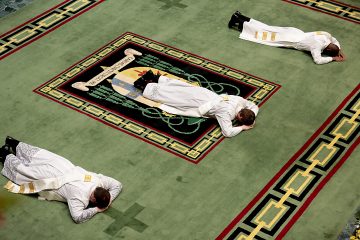Supreme Court will hear cases that challenge ACA contraceptive mandate
Catholic News Service
WASHINGTON — The U.S. Supreme Court agreed Nov. 26 to take up two cases that challenge provisions of the Affordable Care Act requiring employers to provide contraceptive coverage on behalf of for-profit companies whose owners object to the mandate for religious reasons.
Probably in March, the court will take up the cases of Hobby Lobby, an Oklahoma-based, family-run arts-and-crafts chain, and Conestoga Wood Specialties, a Pennsylvania family-run company that makes cabinets.
The cases will be combined for the arguments. A decision is likely by late June.
At issue in both cases will be First Amendment arguments that a federal requirement that the owners of the companies provide insurance coverage they morally oppose violates the owners’ Free Exercise rights as well as their rights under a 1993 law, the Religious Freedom Restoration Act.
Archbishop William E. Lori of Baltimore, chairman of the U.S. Conference of Catholic Bishops’ Ad Hoc Committee for Religious Liberty, was pleased with the court’s decision to take up the cases.
In a Nov. 26 statement he said the review “highlights the importance of this conflict between the federal government and people seeking to practice their faith in daily life.”
“We pray that the Supreme Court will find that the Constitution and the Religious Freedom Restoration Act protect everyone’s right to religious freedom. We are encouraged by the advances in the lower federal courts so far in cases involving family-owned companies as well as nonprofit religious organizations.”
In Sebelius v. Hobby Lobby Stores, the Green family won a ruling by the 10th U.S. Circuit Court of Appeals that said their Hobby Lobby chain of more than 500 stores and Mardel, a chain of 35 Christian bookstores, could proceed with seeking an injunction protecting the companies from meeting parts of the contraceptive mandate issued by the Department of Health and Human Services as part of the health care law.
Both the Justice Department and the Greens asked the Supreme Court to review the case.
The government requires most employers’ health plans to include free coverage of contraceptives, sterilizations and some abortion-inducing drugs.
The Greens say they object to that part of the Affordable Care Act’s employer mandate requiring they provide emergency contraceptive coverage — such as the morning-after pill or Plan B — saying that violates their religious freedom. The family has no moral objection to covering “preventive contraceptives” and will continue to cover those for employees, they have said.
The court agreeing to hear their case is “a major step for the Greens and their family businesses in an important fight for Americans’ religious liberty,” said Kyle Duncan, general counsel of the Becket Fund for Religious Liberty and lead lawyer for Hobby Lobby.
“We are hopeful that the Supreme Court will clarify once and for all that religious freedom in our country should be protected for family business owners like the Greens,” he said in a statement.
In a statement on the Hobby Lobby case issued by the press secretary’s office, the White House said it doesn’t comment on specifics of any case pending before the high court, but “as a general matter” it said the HHS mandate is designed to “ensure that health care decisions are made between a woman and her doctor.”
President Barack Obama “believes that no one, including the government or for-profit corporations, should be able to dictate those decisions to women, it said. The administration said it has already taken steps to “to ensure no church or similar religious institution” is forced to provide contraception coverage and allow women, not “corporate CEOS,” to make their own health decisions.
The second case, Conestoga Wood Specialties v. Sebelius, is an appeal by the Hahn family, the Mennonite owners, of a 3rd U.S. Circuit Court of Appeals ruling that they had to comply with the contraceptive coverage requirement. The circuit court ruled that as a for-profit, secular corporation, Conestoga Wood and its owners are not protected by the Free Exercise clause of the First Amendment.
In its petition for the Supreme Court to review its case, Conestoga Wood argued that the 3rd Circuit’s decision conflicts with rulings by other circuit courts that recognized religious rights of for-profit corporations.
The 1993 law, known as RFRA, says that the government “shall not substantially burden a person’s exercise of religion” unless that burden is the least restrictive means to further a compelling governmental interest.” The legal question raised in the case is whether RFRA protects a for-profit company from having to provide a benefit to which employees are entitled under federal law but to which the owners have religious objections.
The companies also raised the Free Exercise clause as a defense in arguing the mandate infringes on the employers’ right to be free from government interference with their religious beliefs. The argument cites the Supreme Court’s ruling in Citizens United that found a corporate free speech right to participate in the political process through campaign contributions.
The HHS mandate includes an exemption for some religious employers that fit its criteria and has an accommodation for others allowing some employers to use a third-party to provide the contraceptive coverage they find objectionable, but Catholic entities that have brought the lawsuits say the accommodation still does not solve their problem over being involved in providing coverage they reject for moral reasons.
The mandate does not include a conscience clause for employers who object to such coverage on moral grounds.













